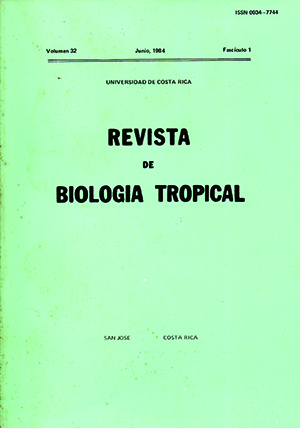Abstract
From the author's field observations and literature records, neotropical "Lantern Bugs" (Fulgora spp.) are now known to use tree species of 5 families as resting, and presumably, feeding hosts: Simaroubaceae-Simarouba amara Aublet; Simaba versicolor St. Hilaire; Fabaceae Hymenaea oblongifolia (var. palustris (Ducke) Lee & Langenheim, Hymenaea coubaril Linnaeus; Myroxylon balsamum (Linnaeus) ; Rutaceae-Zanthoxylum sp. ; Lecythidaceae-Lecythis sp, ; Vochysiaceae- Vochysia tucanorum Martius. Most of these are producers of resins or noxious chemicals which may be sequestered by the bugs.
These trees are also frequented by various arboreal lizards which are good candidates for models for mimicry by the bugs because of the reptilian-like appearance of the latter's large head protuberance and other structural and color features. The resemblance of Fulgora laternaria Linnaeus to Plica plica (Linnaeus) in the Iquitos area of Peru is especially close and this is postulated as the model in that area.
References
Blum , M. S. 1981. Chemical defenses of arthropods. Academic Press. New York, xii, 562 p.
Brailovsky, H. & C.R. Beutelspacher. 1978. Una nueva especie de Fulgara Linneo (Homoptera: Fulgoridae) de México. Ann. Inst. Biol., Univ. Nac. Aut. México, Ser. Zool. , 49: 175-182.
Branner, J. C. 1885. The reputation of the lantern fly. Amer. Nat., 19: 835-838.
Chabrillac. M. 1859. [Communication at society meeting], Bull. Soc. Entomolg. France, Ser 37: cii.
Dixon, J. R., & P. Soini. 1975. The reptiles of the upper Amazon Basin. Iquitos Region, Peru. I. Lizards and Amphisbaenians. Contrib. Biol. Geol. Milwaukee Pub. Mus., 51-58.
Duellman, W. E. 1978. The biology of an equatorial herpetofauna in Amazonian Ecuador; Univ. Kansas Mus. Nat. Hist. Misc. Publ., 65: 1-352.
Etherigde, R. 1970. A review of the South American iguanid lizard genus Plica., Bull. British Museum (Nat. Hist.), Zool., 19: 237-256.
Hinton, H. E. 1 977. Mimicry provides information about the perceptual capacities of predators. Folia Entomol. Mexicana, 37: 19-29.
Janzen, D. H., & C. L. Hogue. 1983. Fulgara la ternaria (Machaca, Peanut-head Bug, Lantern Fly), p. 726-727, In D. H. Janzen (ed.). Costa Rican Natural History (University of Chicago Press), xi, 816 p.
Jones, C.G., A. M. Young, T. H. Jones, & M. S. Blum. 1982. Chemistry and possible roles of cuticular alcohols of the larval atlas moth. Comp. Biochem. Physiol., 73B: 797-801.
Lee, Y. & J. H. Langenheim. 1 975. Systematics of the genus Hymenaea L. (Leguminosae, Caesalpinoideae, Detarieae). Univ. California Publ. Bot., 69: 1-109.
Lenko, K. & N. Papavero, 1979. Insetos no folclore. Conselho Estadual de Artes e Ciencias Humanos, Sao Paulo, 518 p.
Metcalf, Z. P. 1947. Fascicle IV, Fulgoroidea. Part. 9, Fulgoridae. General Catalogue of the Hemiptera. Smith College, Northhampton, Massachusetts. 276 p.
Porter, D. M. 1973. Family 90. Simaroubaceae, Part VI. 60: 23-39. In R. E. Woodson, Jr. & R. W. Schery and collaborators, Flora of Panama. Ann. Missouri Bot. Gard. Potilton, E. B. 1924. The terrifying appearance of Laternaria (Fulgoridae) founded on the most prominent features of the alligator. Trans. Entomol. Soc. London. xliii-xlix.
Poulton, E. B. 1932. The alligator-like head and thorax of the tropical American Laternaria laternaria, I. (Fulgoridae, Homoptera). Proc. Entomol. Soc. London. 7: 68-70.
Stradling, D. J. 1976. The nature of the mimetic patterns of the brassolid genera, Caliga and Eryphamis. Ecol. Entomol., 1: 135-138.
Uphof, J.C.T. 1968. Dictionary of economic plants, 2d ed. Verlag von J. Cramer, Lehre, 591 p.
Vane-Wright, R. I. 1976. A unified classification of mimetic - resemblances. Biol. J. Linnean Soc., 8: 25-56.
Vanzolini, P. E. 1972. Miscellaneous notes on the ecology of some Brazilian lizards (Sauria) Pap. Avul. Zool. Sao Paulo, 26: 83-115.
Williams, E. E. 1965. South American Anolis (Sauria, Iguanidae): Two new species of the Punctatus Group. Breviora, 233: 1-15.
##plugins.facebook.comentarios##

This work is licensed under a Creative Commons Attribution 4.0 International License.
Copyright (c) 1984 Revista de Biología Tropical


